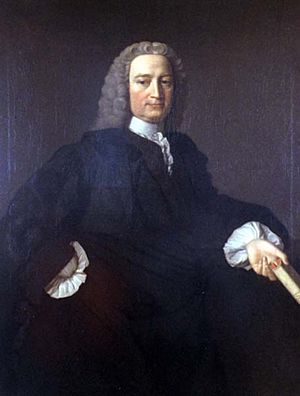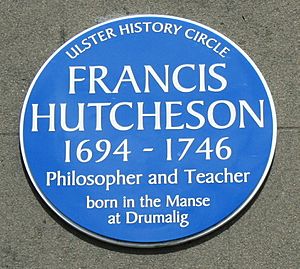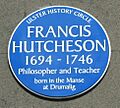Francis Hutcheson (philosopher) facts for kids
Quick facts for kids
Francis Hutcheson
|
|
|---|---|

Portrait of Hutcheson by Allan Ramsay, circa 1745. Wearing a black academic gown over a brown coat, Hutcheson holds a copy of Cicero's De finibus.
|
|
| Born | 8 August 1694 |
| Died | 8 August 1746 (aged 52) Dublin, Ireland
|
| Alma mater | University of Glasgow |
| Era | 18th-century philosophy |
| Region | Western philosophy |
| School | Empiricism Scottish Enlightenment |
| Institutions | University of Glasgow |
|
Influences
|
|
|
Influenced
|
|
Francis Hutcheson (born August 8, 1694 – died August 8, 1746) was an important philosopher from Ulster, a region in Ireland. He came from a Scottish Presbyterian family. He is known as one of the key thinkers who helped start the Scottish Enlightenment, a time of great new ideas in Scotland.
Hutcheson taught Moral Philosophy at the University of Glasgow. He wrote a famous book called A System of Moral Philosophy. His ideas greatly influenced other important thinkers of his time, like David Hume and Adam Smith.
Contents
Early Life and Education
Francis Hutcheson was likely born in a place called Drumalig, near Saintfield, in what is now Northern Ireland. His father was a Presbyterian minister with Scottish roots.
Hutcheson went to school in Killyleagh. Then, he moved to Scotland to study at the University of Glasgow. From 1710 to 1718, he studied philosophy, classics (ancient Greek and Roman studies), and literature. He also studied theology, which is the study of religious beliefs. He earned his degree in 1712. While he was a student, he also worked as a tutor for the Earl of Kilmarnock.
Starting a Career in Ireland
After his studies, it was hard for Hutcheson to find a good position in Scotland. People were suspicious of his Irish background and his connections to certain religious thinkers. So, he went back to Ireland to work in academia (teaching and research).
He decided to open his own private school in Dublin. He taught there for ten years with help from Thomas Drennan. In Dublin, his writing and intelligence made him friends with many important people. One of these friends was Dr. William King, the Archbishop of Dublin. The Archbishop even protected Hutcheson when some people tried to stop him from running his school without a special license. Hutcheson got along well with many church leaders.
In 1725, Hutcheson married his cousin, Mary Wilson. She brought a lot of property with her, including land in County Longford. They had seven children, but only one, also named Francis, survived.
While living in Dublin, Hutcheson secretly published four important essays. In 1725, he released Inquiry concerning Beauty, Order, Harmony and Design and Inquiry concerning Moral Good and Evil. These two works were later combined into Inquiry into the Original of our Ideas of Beauty and Virtue. In 1728, he published Essay on the Nature and Conduct of the Passions and Affections and Illustrations upon the Moral Sense. These writings helped make him well-known.
Teaching at Glasgow University
In 1729, Hutcheson became the Professor of Moral Philosophy at the University of Glasgow. He took over from his old teacher, Gershom Carmichael. He was the first professor there to teach in English instead of Latin. Even though his most famous books were already out, his new job gave him more time for his studies.
During his time at Glasgow, Hutcheson taught and influenced many students, including the famous economist and philosopher Adam Smith. Smith later wrote The Wealth of Nations, a very important book about economics. The way Hutcheson organized his lessons on moral philosophy was similar to how Smith structured his own ideas in his lectures and books.
Hutcheson was known as an amazing lecturer. He was one of the most popular teachers at the University of Glasgow. Students and colleagues admired his passion and sincerity. He didn't just teach philosophy; he inspired his students to live by its principles. Adam Smith called him "the never to be forgotten Hutcheson," showing how much he respected his mentor.
Key Ideas: Ethics and Morality
Hutcheson's most important ideas are about ethics, which is the study of what is right and wrong. He disagreed with philosophers like Thomas Hobbes who believed people are only motivated by self-love. Hutcheson thought that humans have a natural "moral sense."
He believed we have different "senses," not just the five we usually think of (sight, touch, etc.). These include:
- Consciousness: Knowing what's happening in our own minds.
- Sense of beauty: How we appreciate beautiful things.
- Public sense: Feeling happy when others are happy and sad when they suffer.
- Moral sense: An inner feeling that tells us if actions are good or bad.
- Sense of honor: Feeling good when others praise us and bad when they blame us.
- Sense of the ridiculous: What makes us laugh.
The "moral sense" was central to Hutcheson's ideas. He said it helps us immediately know if an action is virtuous (good) or vicious (bad). He believed that nature has given us a quick and powerful way to know what is right, just like we have instincts to protect our bodies. He thought that virtue is naturally appealing and that we have strong feelings that push us to do good things.
Hutcheson also believed that the best actions are those that create "the greatest happiness for the greatest number" of people. This idea was later developed by other philosophers like Jeremy Bentham and is called utilitarianism.
He argued that kindness and goodwill (benevolence) are the main reasons for many of our actions. He thought that actions done purely out of self-interest are not morally good. However, he also admitted that taking care of oneself (like being careful or hardworking) is important for society to function.
Influence on American Thought
Francis Hutcheson's ideas had a big impact in Colonial America. He was probably the most respected moral philosopher in America during the 1700s.
His book, Inquiry into the Original of Our Ideas of Beauty and Virtue, was used as a textbook at Harvard University as early as the 1730s. In 1761, a speaker at a public event in Massachusetts praised Hutcheson as an "approved writer on ethics."
His book Short Introduction to Moral Philosophy was used at the College of Philadelphia (now the University of Pennsylvania). Francis Alison, a professor there, had been Hutcheson's student and taught his ideas. Many of Alison's students became important figures in the American Revolution, including three who signed the United States Declaration of Independence. They learned their ideas about freedom and rights from Hutcheson and Alison.
John Witherspoon, another signer of the Declaration and president of the College of New Jersey (now Princeton University), also used Hutcheson's views in his lectures. Some historians believe that Hutcheson's ideas, especially about "unalienable rights" and the right to resist unfair government, influenced the way the Declaration of Independence was written.
Death
Francis Hutcheson died in Dublin, Ireland, in 1746, while visiting the city. He is buried in the churchyard of Saint Mary's. Today, this churchyard is a public park called Wolfe Tone Street. Many Irish patriots admired Hutcheson's memory. Even though his grave is unmarked, he is remembered as "the never to be forgotten Hutcheson" in the city where he did much of his important work.
Images for kids
See also
 In Spanish: Francis Hutcheson para niños
In Spanish: Francis Hutcheson para niños
 | John T. Biggers |
 | Thomas Blackshear |
 | Mark Bradford |
 | Beverly Buchanan |




